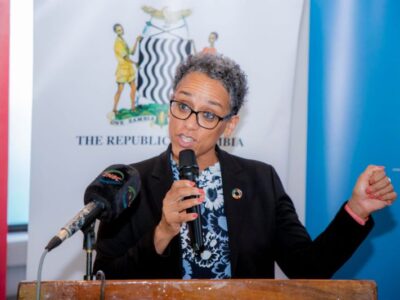A joint Agro industrial park undertaken between Zambia and Zimbabwe once fully set up will accelerate industrialisation and structural transformation.
The proposed project, the Common Agro-Industrial Park (CAIP), is expected to increase the availability of industrial goods and services and expand intra regional trade in value added agricultural products.
United Nations Economic Commission for Africa Sub regional Office for Southern Africa (ECA SRO-SA) Economic Affairs Officer Oliver Maponga said the Special Economic Zones being established between Zambia and Zimbabwe once fully operational would enhance value addition and deepen linkages.
Maponga said there are two initiatives that are being implemented in Zambia under the Special Economic Zones framework, namely, the Democratic Republic of Congo (DRC)-Zambia Battery Precursor Project (battery mineral value chain) and the Common Agro-Industrial Park.
He said the two initiatives are exploiting the method of industrial development and industrialization and value chains development anchored on economic zones across the national boundaries between the involved member countries.
So far, Maponga said, a feasibility study on CAIP was conducted to determine the opportunities that can be derived from the Agro industrial park.
In an interview during the Africa Regional Forum for Sustainable Development in Niamey on Thursday, Maponga said this was aimed at making a preliminary business case for the CAIP.
Working with the COMESA Secretariat, we went on and developed the harmonised policy, legal, regulatory and institutional framework which will be aligned and harmonised to what will be obtaining in Zambia and Zimbabwe.
This framework was validated by the two member states and other stakeholders in August last year,” Maponga said.
Furthermore, Maponga said sensitization on the Common Agro industrial park was conducted in both countries, stating that they held consultative meetings with the stakeholders in Zambia and Zimbabwe.
He said the meetings were important especially for the private sector because they are the ones that are going to setup investments in these zones.
Maponga pointed out that government will provide a favorable operating environment but it’s the private sector that would pick up the business opportunities within the agro industrial park.
He said the government will provide the necessary incentives to allow for industrial activities to take place.
“They will be opportunities for agriculture production, business linkages, agricultural, machinery and chemical production.
“This is what we want to bring together in this big common agro park to facilitate exploitation of the opportunities created by the African Continental Free Trade Area (AfCFTA),” Maponga said.
He said this means that agriculture products can access a larger African market through the AfCFTA and other international linkages that emerge from the common agro industrial park.
This will help develop industrialists, including micro, small and medium enterprises, that would acquire ownership and management of the industries, develop appropriate skills and knowledge in industries.
He said this will also strengthen collaboration and bolster networking among various partners and deepen regional integration.
Maponga said the current focus is on resource mobilization for a detailed feasibility study on the CAIP by technical partners supporting the initiative working with the member States.
Warning! All rights reserved. This material, and other digital content on this website, may not be reproduced, published, broadcast, rewritten or redistributed in whole or in part without prior express permission from ZAMBIA MONITOR.











Comments